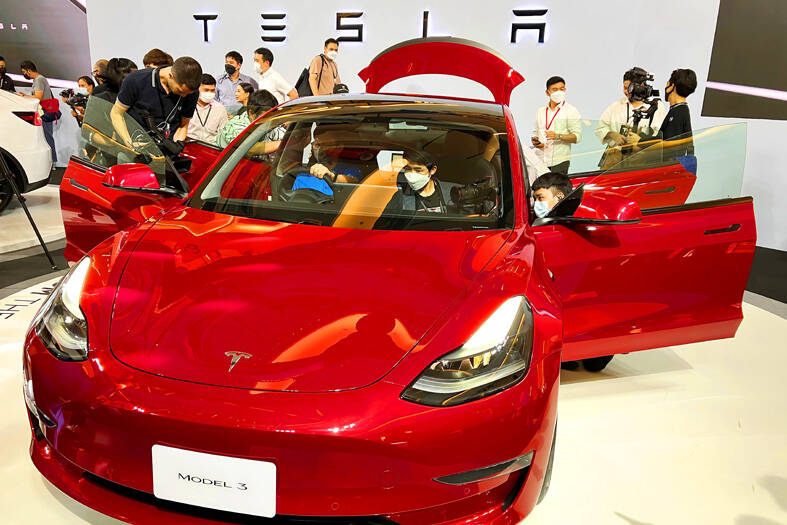Tesla Inc has launched sales in Thailand, offering its popular Model 3 and Model Y at prices aimed at competing with rivals such as China’s BYD Co (比亞迪).
Tesla yesterday staged a glitzy showcase of its plans at Bangkok’s Siam Paragon shopping mall. Online purchases have begun, with plans to deliver vehicles to buyers in the first quarter of next year.
Southeast Asia’s market of more than 600 million consumers is increasingly a focus for automakers looking to expand sales, especially of electric vehicles (EVs).

Photo: AP
Tesla said the vehicles would have the latest satellite navigation systems and other features such as over-the-air software updates.
The company is selling its Model 3 Long Range and Performance models, while the Model Y would be sold in three versions “to meet the specific demands of the EV lifestyle for every Thai driver,” the company said.
Prices are to range from 1.76 million baht to 2.5 million baht (US$50,218 to US$71,332), it said.
Tesla is to open its first service center and supercharger station in Thailand by March, and plans to have at least 10 set up in the country next year, it said.
Apart from Tesla and BYD, Nissan Motor Co has made Thailand a regional EV hub, while Mercedes-Benz Group AG says it is due to announce sales of its EQS450+ soon.
Nithi Thuamprathom, an auto expert for Auto Life Thailand, said Tesla’s launch would likely give the EV market in Thailand a big boost, largely thanks to its competitive pricing and brand value, which is an advantage over Chinese automakers like BYD.
“It’s unbelievable that Tesla announced the entry price [of its cheapest model] at 1.7 million Thai baht,” he said. “That’s the price of Japanese cars with combustible engines or hybrid engines. This will create such a big change in the market.”
Still, Thailand remains mainly a land of gasoline, diesel and liquefied petroleum gas-fueled vehicles, even as a nationwide network of charging stations expands.
“The EV trend is growing in Thailand and there is an increase in the consumer acceptance, but we have to accept that this is just a beginning,” Nithi said. “It’s in a pioneering stage.”

SELL-OFF: Investors expect tariff-driven volatility as the local boarse reopens today, while analysts say government support and solid fundamentals would steady sentiment Local investors are bracing for a sharp market downturn today as the nation’s financial markets resume trading following a two-day closure for national holidays before the weekend, with sentiment rattled by US President Donald Trump’s sweeping tariff announcement. Trump’s unveiling of new “reciprocal tariffs” on Wednesday triggered a sell-off in global markets, with the FTSE Taiwan Index Futures — a benchmark for Taiwanese equities traded in Singapore — tumbling 9.2 percent over the past two sessions. Meanwhile, the American depositary receipts (ADRs) of Taiwan Semiconductor Manufacturing Co (TSMC, 台積電), the most heavily weighted stock on the TAIEX, plunged 13.8 percent in

A wave of stop-loss selling and panic selling hit Taiwan's stock market at its opening today, with the weighted index plunging 2,086 points — a drop of more than 9.7 percent — marking the largest intraday point and percentage loss on record. The index bottomed out at 19,212.02, while futures were locked limit-down, with more than 1,000 stocks hitting their daily drop limit. Three heavyweight stocks — Taiwan Semiconductor Manufacturing Co (TSMC, 台積電), Hon Hai Precision Industry Co (Foxconn, 鴻海精密) and MediaTek (聯發科) — hit their limit-down prices as soon as the market opened, falling to NT$848 (US$25.54), NT$138.5 and NT$1,295 respectively. TSMC's

In a small town in Paraguay, a showdown is brewing between traditional producers of yerba mate, a bitter herbal tea popular across South America, and miners of a shinier treasure: gold. A rush for the precious metal is pitting mate growers and indigenous groups against the expanding operations of small-scale miners who, until recently, were their neighbors, not nemeses. “They [the miners] have destroyed everything... The canals, springs, swamps,” said Vidal Britez, president of the Yerba Mate Producers’ Association of the town of Paso Yobai, about 210km east of capital Asuncion. “You can see the pollution from the dead fish.

TARIFFS: The global ‘panic atmosphere remains strong,’ and foreign investors have continued to sell their holdings since the start of the year, the Ministry of Finance said The government yesterday authorized the activation of its NT$500 billion (US$15.15 billion) National Stabilization Fund (NSF) to prop up the local stock market after two days of sharp falls in reaction to US President Donald Trump’s new import tariffs. The Ministry of Finance said in a statement after the market close that the steering committee of the fund had been given the go-ahead to intervene in the market to bolster Taiwanese shares in a time of crisis. The fund has been authorized to use its assets “to carry out market stabilization tasks as appropriate to maintain the stability of Taiwan’s